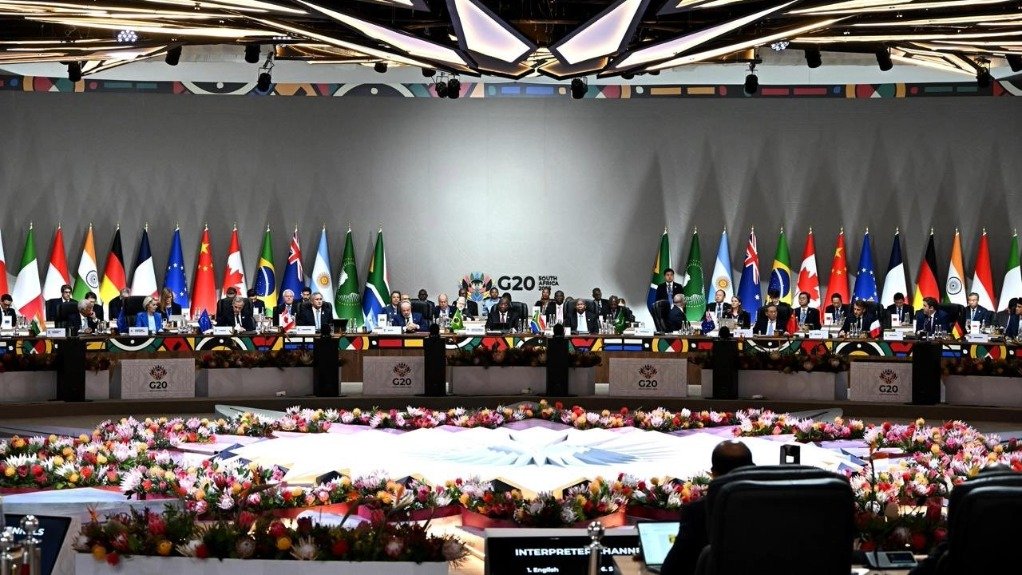The G20's leadership is heading away from the Global South just as debt problems in poorer countries threaten to flare again, testing whether the group's ambitions on debt relief will translate into action under a United States presidency.
South Africa on Sunday handed the G20 presidency over to the United States, completing a run of four major emerging economies, including Indonesia, India and Brazil, steering the group, years in which debt sustainability across developing nations became an increasingly prominent priority.
Debt across emerging economies has hit a record high, topping more than $100 trillion. In Africa, the topic is acute: with the International Monetary Fund warning that some 20 African countries were in or at high risk of debt distress.
"It's important that we find solutions and not just tinker at the margins," said Trevor Manuel, former South African finance minister and chair of the G20 Africa Expert Panel, which has been advising South Africa's President Cyril Ramaphosa.
Senegal emerged as a flashpoint after billions of dollars in undisclosed borrowing prompted the IMF to freeze a $1.8-billion programme and triggered a sharp ratings downgrade.
Gabon has turned to liability-management deals to ease repayment pressure, including regional bond swaps worth about $1-billion. Mozambique has sought advisers for a restructuring, while Malawi's debt levels are nearing 90% of GDP.
While the G20 launched the Common Framework in 2020, designed to pave the way for swift debt reworks for poorer nations after the Covid pandemic, progress in overhauling the international financial architecture has been slow.
G20 EFFORTS AND THE LIMITATIONS OF THE COMMON FRAMEWORK
South Africa tried to reinvigorate efforts during its year as G20 chair. The group's finance ministers issued a stand-alone Ministerial Declaration on Debt Sustainability – the first since the pandemic - and committed to strengthening the Common Framework.
The framework has delivered debt treatments to four nations — Chad, Zambia, Ghana, and Ethiopia — since its launch.
Eric LeCompte, executive director of development group Jubilee USA Network, said this showed the limitations.
But he said the agenda of the United States, which will lead the G20 until late 2026, included addressing debt challenges, boosting economic growth and expanding job creation - offering some continuity.
LeCompte said the G20 Africa Engagement Framework, launched in October by its finance ministers to address hurdles to growth and development on the continent, marked an accomplishment.
It will deal with issues "from economic growth to debt and financing to development to anti-poverty initiatives to creating jobs across the continent," said LeCompte.
SHIFTING PRIORITIES AND THE PATH TO REFORM
Vera Songwe, a member of the economic advisory council of President Ramaphosa, said there needed to be revisions to the debt sustainability framework, particularly those that improve financing conditions for poorer nations.
"When multilateral development banks use guarantees, they should not be penalised," she said, underscoring calls for reforms of the Basel Framework to reduce borrowing costs.
The G20 had shown in the past it can make a difference – from post-2008 financial crisis stimulus packages to the Covid-era Debt Service Suspension Initiative – but it has limits, said Gilad Isaacs of South Africa’s Institute for Economic Justice.
"It doesn't make policy. It's got no legal standing," he said. "We will have to find other spaces to drive those conversations and those changes", including a proposed borrowers' platform.
South Africa's Finance Minister Enoch Godongwana said he would push forward the group's recommendations from the past year, including the institutionalisation of debt relief efforts.
EMAIL THIS ARTICLE SAVE THIS ARTICLE FEEDBACK
To subscribe email subscriptions@creamermedia.co.za or click here
To advertise email advertising@creamermedia.co.za or click here











